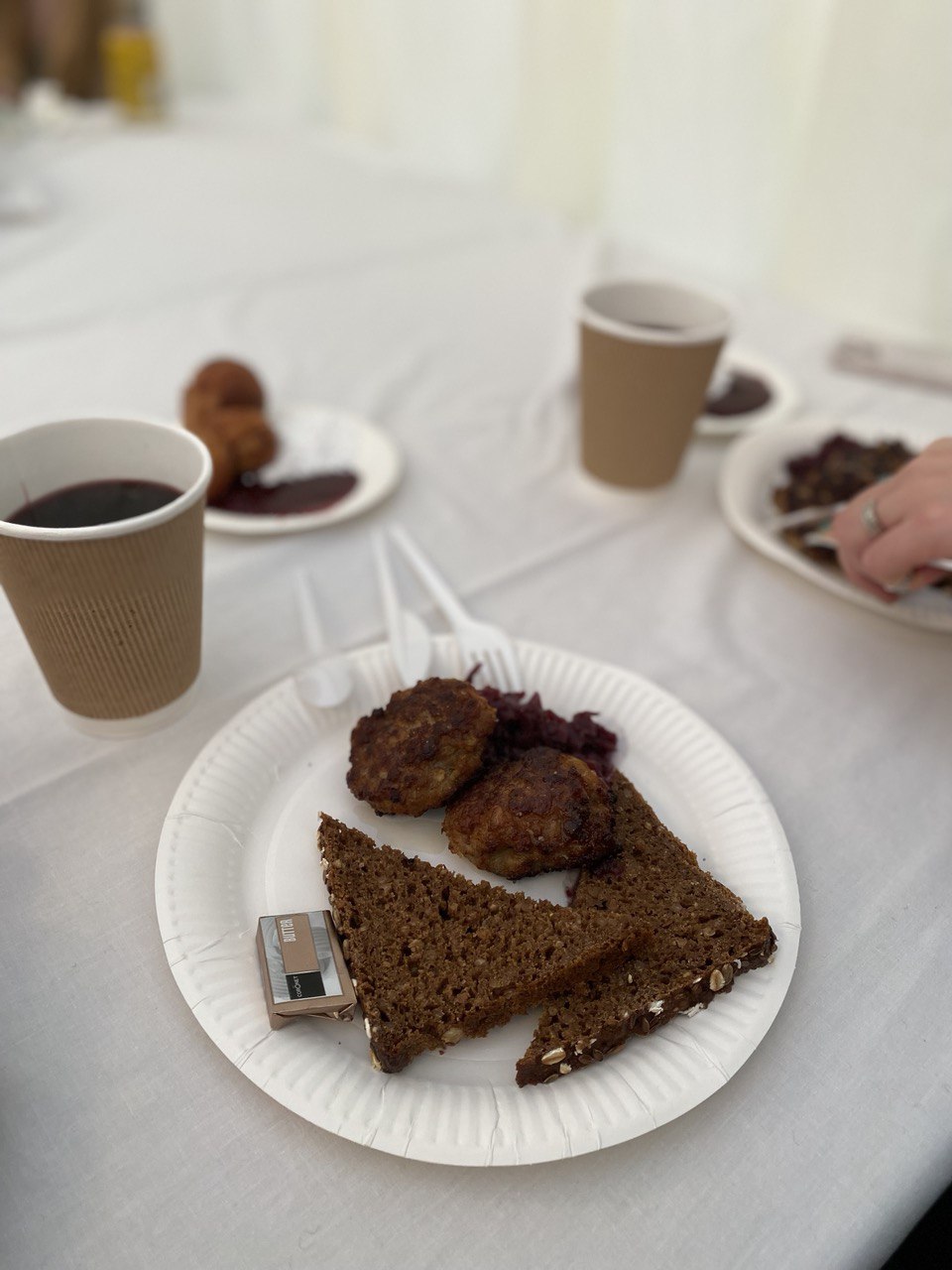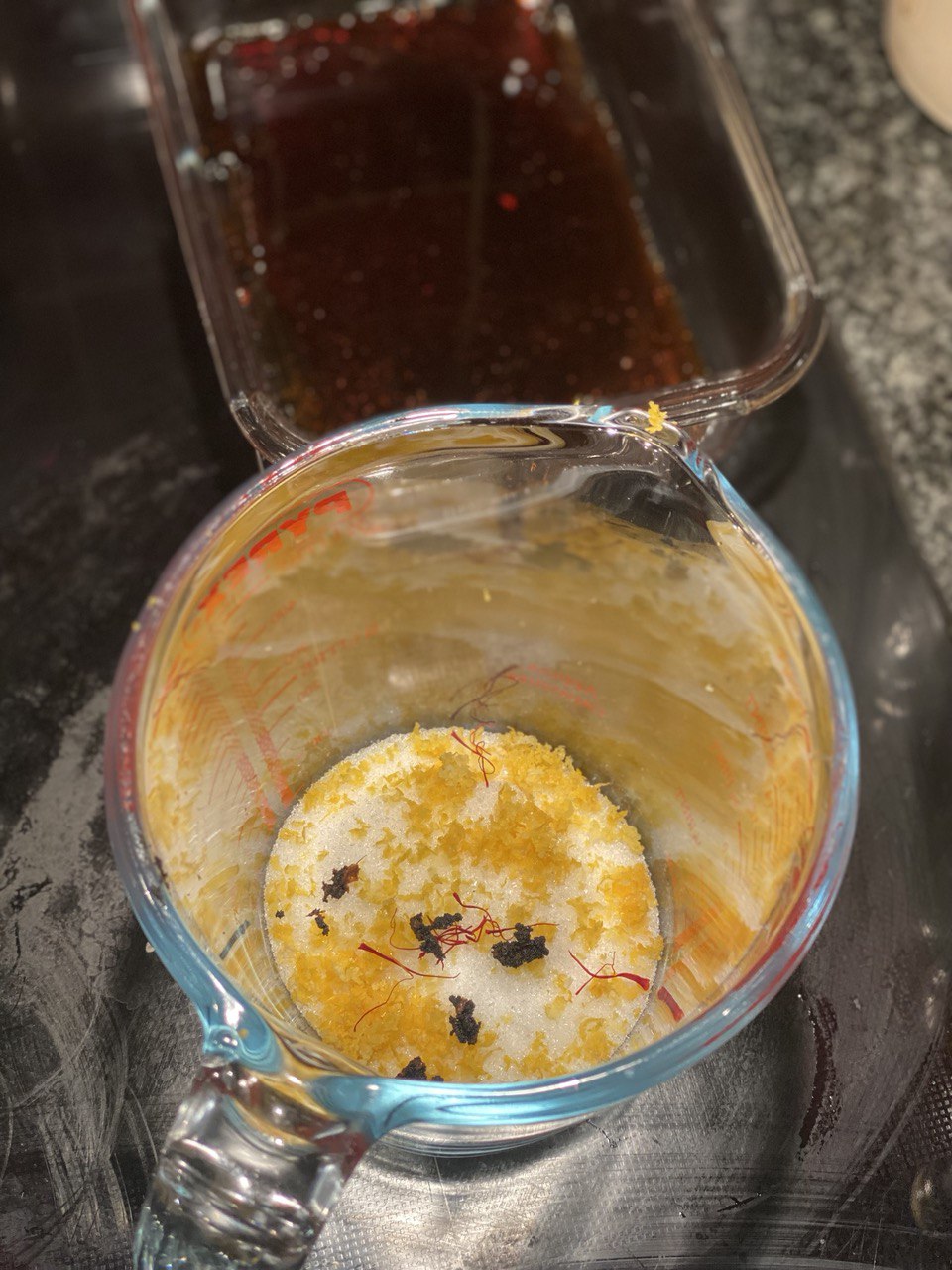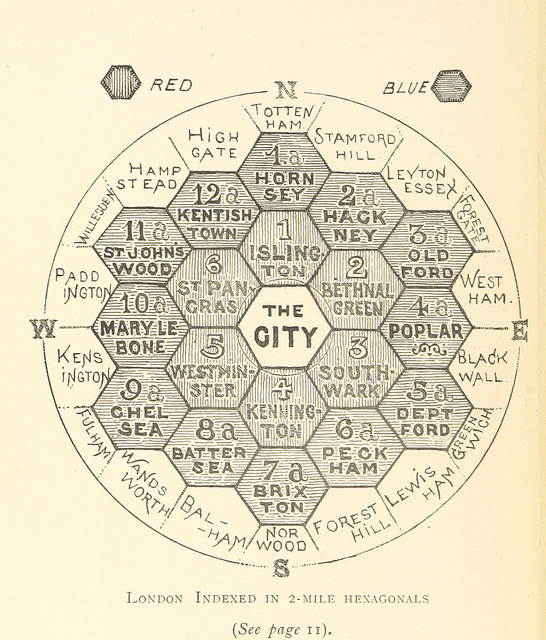Tuesday Triage - Tuesday Triage #124
TUESDAY TRIAGE #124
by Vadim Drobinin
Your weekly crème de la crème of the Internet is here!
29.11.2022 (read in browser)
-
Intro
Whatever is on my mind this week. -
Things I enjoyed reading
Ten-ish articles I found worth reading. -
Things I didn't know last Tuesday
Ten-ish facts I didn't know when I wrote the previous edition. -
Book of the week
Some thoughts on the latest book I've read.
This is the 124th edition of the newsletter, and as I mentioned recently while most of emails now require a paid subscription, once a month I will be sending out a free edition – this is it.
If you'd like to receive this newsletter every week, as well as get access to an archive of all previous free and paid editions, you can do it here.
Since the previous email you've missed three newsletters:
-
#121 on songs, where I explore the new Noma 2.0 book, visit the Royal Albert Hall, and learn about bars in Antarctica.
-
#122 on wild ingredients, where I cook salsify, sweetbreads, pigeons, chanterelles, encounter the origins of Carbonara, and understand the mechanics of alcohol-induced blackouts.
-
#123 on the front row, where I come back to Hamilton the Musical, question bone marrow luges, and devour the book on eating insects.
On Danish cuisine
It's still November but seems like everyone around is already getting ready for Christmas. I did my part by tagging along for a visit to a Danish Christmas market in Hampstead, which seems to become a tradition by now.
No beautiful photos, and yet this was as tasty as it was filling: Rugbrød (rye bread), Gløgg (mulled wine with nuts), æbleskiver (pancakes), frikadeller (Danish meatballs), and Rødkål (red cabbage), all for mere £11 (ok, yes, I could've got a Sunday roast in a pub for the same price).

Last year I was too lazy to queue to grab a bottle of something called Juleøl (Christmas beer), but this time we actually managed to grab a few. I can't really say I am mindblown, but the addition of English liquorice is a fun way to boost fruity and spicy notes in a drink.

And while I didn't have time to cook over the weekend, I had time to finish some of the desserts I've made before, while still exploring the Bo Bech's book with modern Danish cuisine:
This is a mix of saffron, lemon zest, and sugar:

And this is quince layered over caramel and sprinkled with the dry mix. I was initially going to turn this quince into either a jam or some quince cheese, but didn't buy enough.

After cooking at 90ºC overnight, and then freezing for 24 hours, the quince is plated with some Tunworth cheese ice cream (the author used vanilla cream, but I didn't have cream and had the ice cream). Delicious and looks like a rare steak somehow.

We also had some baked pumpkin leftovers, which were marinated in a mix of honey and orange juice, and then plated with orange sherbet and reduced marinade.

As you might tell from my previous encounter with recipes from the same author, this book is probably one of the easiest to cook from, with recipes calling only for a handful of ingredients, but the flavours are unexpectedly impeccable.
Things I enjoyed reading
1. Expensive restaurants are still opening all the time. I’m a bit offended by Giles Coren
While I agree with the author's take on restaurant prices, there are more ways to make the experience more expensive. Some restaurants maintan the same menu costs, but remove premium ingredients. Not everyone would notice that a cooked-to-perfection-turbot is replaced by also-perfect-steamed-cod, but it makes a huge difference.
One minute, you’ve got a table booked at Maison François or Dorian or St Barts, and the next minute your mortgage has gone up by two grand a year and you’re on the phone to them saying, “Dreadfully sorry, my grandma died and also my dog ate my cheque book and I may have Covid, so I shan’t be able to make it.”
Also serving sizes could suffer – a restaurant in London recently announced that they drop the price of their takeaway sandwiches from £12 to £6 and people got pleasantly surprised but the place also decided to reduce their size in half.
2. Photography for geeks by @lcamtuf
The only photos I can make with consistent desency are those of food, and mostly that's because of modern technologies, not my photography skills. I do respect those who can actually understand what they're doing though:
Most novices think that illumination is entirely out of their control, but it isn't so. A solid grasp of the fundamentals allows one to leverage the environment. When shooting outdoors, you might ask your subject to stand near an exterior wall to eliminate the harsh shadows that plague most vacation shots. Indoors, you might move toward a nearest window or stay clear of recessed lights.
Probably every half a year or so I think of getting some lights and reflectors, and improve my photos, but then most of the time I take pictures of food in restaurants with mediocre lighting at best, so why bother.
3. Pakistan's lost city of 40,000 people by Samantha Shea
An interesting story about trying to reconstruct a history of a place based on its ruins:
Mohenjo-daro – which means "mound of the dead men" in Sindhi – was the largest city of the once-flourishing Indus Valley (also known as Harappan) Civilisation that ruled from north-east Afghanistan to north-west India during the Bronze Age. Believed to have been inhabited by at least 40,000 people, Mohenjo-daro prospered from 2500 to 1700 BCE.
One would think that by 2022 we pretty much ran out of places to discover, but these encounters seem to happen even more often than before.
4. GPS by @bciechanowski
I am a big fan of interactive articles, and yet this one is probably the best one I've seen this year. Even if you weren't going to learn how does GPS work, please do yourself a favour and spend some time skimming through this post:
Intuitively, if we’re standing right on top of one of the colored landmarks, then we can tell exactly where we are on the map. If we take a single step away from a landmark, then our accuracy will degrade a little, but we’re still reasonably sure of our position. However, as we keep going further away the uncertainty in our estimate increases.
Also note how most illustrations are clickable and could be interacted with.
5. Beyond Meat Is Struggling, and the Plant-Based Meat Industry Worries by @julie_creswell
Those reading this newsletter for a while know that I don't try to be objective and always share my personal opinion, especially when it comes to classic writers, so while I think that fake meat is an abomination, and only a week ago learnt about plant-based oysters, I do think that those companies are doing a great thing by turning meat into a premium product.
While inflation played a role, so did a decline in the perception that plant-based meats are healthier than animal proteins. (The companies focus on the environmental benefits.) But the Deloitte analysts said another problem might be resistance to a product that some segment of customers see as “woke” and linked to politically left-leaning ideas.
The world would only benefit from the increase in vegan population, as these people will both drive the research in the world of vegetables but also remove the pressure on the meat industry, which in turn might focus on improving the quality.
I also would love to be able to 3D print steaks at home, but that's just me being lazy.
6. Family matters by Parmanu
An interesting perspective on immigration for a better life vs staying with family. As someone who's left my motherland more than half a decade ago and haven't been back since, I do relate to the topic:
Some days later I received a message from a niece in India. She had just graduated with a degree in computer science and was looking for opportunities to study abroad – would Germany be a good option? The move, if it happened, would take her thousands of miles away from her parents in Bangalore. Hers is the aspiration of the average young Indian graduate: to seek opportunity, no matter how far from home. And she would probably find it hard to understand E’s story, to see why someone would leave a good job for no other reason than to be close to family.
I'd also say that it boils down to something akin to the Maslow's hierarchy of needs, where people don't care about belongingness and love needs until their safety and physiological needs are satisfied. Self-actualisation comes later, and for some it's about work, while for others it's about their extended family.
7. What if we talked about the over-60s’ screen time the way we talk about young people’s screen time? by @WebDevLaw
Modern generations are often blamed for spending so much time in front of their mobile phones and computers but the author has a great point: the older generation spends even more time in front of a TV:
I wasted what should have been the best years of my life being a part of a family whose life, like so many British families, revolved around the television. The goddamn thing had to be on every waking minute, no exceptions, tuned into the most banal programming possible. This was not a family that got deep into box sets which pushed the boundaries of the craft of film and television. This was a family that stared at 40’s derring-do war films, 50s melodramas, 60s nostalgia, 70s cop shows, 80s murder mysteries, 90s game shows, and 00’s property and antiques porn – so much fucking property and antiques porn – plus a topsoil layer of nonstop WWII documentaries.
I wonder how much of that TV consumption is active though. When I was growing up, my grandparents would often have the TV on in background, but most of the time they didn't really watch it that actively and could even read a book in the meantime.
8. On Poverty’s Indelible Marks by Christian Livermore
By now we know that some things leave a mark on people's identities, and seems like childhood in poverty is one of those things:
The more research scientists do on people who grew up in poverty, the more they realize that living in poverty is like being in a war. People who have grown up poor can have PTSD, and many don’t have the mental bandwidth that other people have for normal life stressors. Or at least I don’t. I become frustrated very easily. If I can’t get the lid off a jar, I feel like throwing the thing across the room.
The author defines poverty through examples, but that's probably rather vague and depends on the context a lot.
9. Life as a door to door salesman by @spatatimes
I am pretty sure I've seen salesmen only in movies, so learning that they're still a thing is pretty cool and gives me a chance to meet one eventually.
They didn’t all come so easily, but he studied videos of the world’s best door-to-door reps in action and learned to be “a chameleon,” matching each potential customer’s energy.
He knocked on thousands of doors. People would greet him with the finger, with an f-bomb, with their buck-naked body. One grumpy man held a shotgun. Liam complimented the weapon, sold him a system and then drank one of the guy’s Busch Lights with him to celebrate.
Most stories in the post won't really lose much if you were to replace "salesman" with "cryptotrader", but that's just the way it is.
10. Cross the world four times by @sivers
A very short and yet powerful thought on traveling:
The second time, in your 30s, to tell everyone what you’ve learned. You’re full of answers, since you’ve done so much. You know how things should be, since you’ve made all your mistakes. You can see the path clearly, and it’s your turn to lead.
Cross the world the second time to make change.
I guess soon will be the time for the second one then.
Things I didn't know last Tuesday
1. Why some feces float and others sink
There is a Russian proverb, roughly translated to something along the lines of "shit always floats". It could be used in many ways, from giving the moral support to someone afraid of swimming to explaining why some moron managed to avoid troubles without a scratch.
Well seems like it doesn't float all the time.
The researchers then collected stool samples from healthy mice that were not part of the original study, but who produced floaters, and injected the material into the guts of the sterile mice. They found that all of the test mice began producing floaters. This, the researchers contend, suggests that the reason some fecal matter floats is due to the nature of the bacteria in the gut—some produce more gas than others.
Probably not the trivia I'd tell during a Christmas dinner though.
2. How Safe Is Ayahuasca?
Not everyone would be keen on drinking some psychodelic liquid and then spend a few days in a trans dealing with mental health issues, but at least it doesn't seem to lead to severe problems (most of the time):
It appears that ayahuasca has notable – though rarely severe – side effects on both physical and mental health, which have implications for public health: “In that sense, ayahuasca practices can hardly be assessed with the same parameters used for prescription medicines,” the authors say, “since the myriad of its effects include challenging experiences that are intrinsic to the experience, some of which are considered as part of its healing process.”
That being said, if I were to try something as intense I probably won't be starting with ayahuasca anyway.
3. "Goncharov", a fake Martin Scorsese film
Last time I learnt about a toaster inventor's hoax, but this one is probably even better: someone created a fake movie poster, and people got really keen on making it as real as possible.
And like all of the best jokes, people have really committed to the bit. There’s the film’s poster, which has the tagline “greatest mafia movie (n)ever made”. A music teacher in Indiana composed a theme song for Goncharov, inspired by The Godfather. There is also a cash-in video game, with an accompanying soundtrack, and a fake VHS. “Academics” wrote essays analysing the film, which were published in (fake) film journals. A representative for the movie reviewing platform Letterboxd even told the New York Times that they had had to remove multiple reviews for the film that had been submitted by users.
Movies are easier to fact-check though, so at least one could quickly check a torrent or two.
4. Changeling
A beautiful (not really) piece of folk tales, used to avoid the blame on lack of medicine and skills:
A changeling, also historically referred to as an auf or oaf, is a human-like creature found in folklore throughout Europe. A changeling was believed to be a fairy that had been left in place of a human (typically a child) stolen by other fairies.
Interestingly, similar stories happen all over the globe, from Africa to Poland.
5. Hexagonal Map of London
I know London well enough to find my way around the city centre, but this map would have made it way easier for tourists:
This map is taken from an book “The Unification of London: The Need and the Remedy” written by John Leighton and published in 1895. London is split up into neat hexagons, colour-coded according to their proximity to the centre of the metropolis (defined as St Paul’s Cathedral rather than the more normal Charing Cross.)

The author of the map (more than 100 years ago!) also proposed a plan to change signs across the city to make navigation even easier, but it didn't really work out, which is a shame.
6. Eye contact marks the rise and fall of shared attention in conversation
Seems like a nice trick (although also a very intuitive one):
However, rather than elicit synchrony, eye contact commences as synchrony peaks and predicts its immediate and subsequent decline until eye contact breaks. This relationship suggests that eye contact signals when shared attention is high. Furthermore, we speculate that eye contact may play a corrective role in disrupting shared attention (reducing synchrony) as needed to facilitate independent contributions to conversation.
Now I just need to find the right balance between "that dude creepily stares at me for five minutes" and "he doesn't look at me at all".
7. Victor Belenko
Just learnt about this pilot who defected from USSR to the US, and then couldn't believe that supermarkets are real and spend lots of time thinging that they're fake and are built for him by FBI.
Once he settled though, he started to buy something new to try every day, and especially highlighted the quality of pet food (he didn't have pets):
Last year I brought four people from Russia for commercial project, and I set them up. I bought nibble sized human food. I installed a pâté, and it was cat food. I put it on crackers. And they did consume it, and they liked it. So the taste has not changed. By the way, for those who are not familiar with American cat food. It’s very safe; it’s delicious, and sometimes it’s better than human food, because of the Humane Society.
Sounds like a nice idea for a party.
8. The Potato Paradox
This is a cool example of how truth is often counterintuitive.
Alice has 100kg of potatoes, which are 99% water. She lets them dry till they are 98% water. What is their new weight?
50kg.
I could've linked straight to Wikipedia here but there are more fun paradox where it comes from so check them out too.
9. The Voyage of Life
A really nice series of paintings, that is:
The Voyage of Life is a series of four paintings created by Thomas Cole in 1842, representing an allegory of the four stages of human life. The paintings, Childhood, Youth, Manhood, and Old Age, depict a voyager who travels in a boat on a river through the mid-19th-century American wilderness.

And it also links well with the "cross the world four times" article from above. I couldn't find an image with all four pictures together though, but there is more than one out there (also a few drafts).
10. Daisugi
Seems like its only relationship to tea is the use for building tea rooms, but nowadays that's also a way to collect tree trunks without destroing the whole trees.
Shoots from the base of the tree are pruned so that the trunk stays straight. It is believed that the production of logs by daisugi began in the Muromachi period. At that time, the tea ceremony became popular in part because daisugi logs were used in tea room construction, for example for the tokonoma alcove.

It also looks pretty cool.
Book of the week
We came across Michael & Rick Mast's Mast Brothers Chocolate in a charity shop, and while I don't remember trying, or reading about their chocolate it's always hard to pass by a JBF Awards' winner – and you can usually tell it by illustrations alone.
We maxed out our cards quickly buying a refrigerator, molds, and a miniature winnower. The next piece we needed was an oven. The three-pound coffee drum roaster wasn't moving us forward, and the husks had a tendency to crack from the churning, resulting in burnt batches. Rick's instinct was to use a convection oven as many restaurant kitchens do. We turned to Craigslist. New, these ovens were about four grand or more, but to our surprise we found a used one for sale for a thousand bucks. We called and headed to the location on Broadway to pick up the old beast, which was missing a few lights and buttons. It was in an empty space with cracked tile floors, but we were assured that it worked, with the only disclaimer being that it had roasted hundreds of chickens. We took the seller's word for it, told him we were going to clean it like new, and then asked about the space we were in. It was to be a butcher shop, Marlow & Daughters. Music to our ears. We had just started selling our bars at Marlow & Sons just down the street. They said to forget about the money for this old oven and instead we bartered, dropping off boxes and boxes of chocolate in exchange. If only it were always going to be so easy. Our factory filled up with the pallets of burlap cacao sacks, equipment, inventory, worktables, and a desk. We already needed more space.
The book is a great mix of memories and stories, and recipes that build on top of each other (you make a chocolate syrup for one dessert and then go ahead and convert it into chocolate soda and steak sauces), and are not afraid to question the conventional ways of cooking (who said cocoa nibs can't be a meat crust?).
I had to look the folks up, and while their store in London seems to be permanently closed, the reviews range from "This store is like if Apple did chocolate" to "They used to mix Valrhona callets into their bars", so there is also that.
I do plan to cook some of their savory recipes first though, so stay tuned.
Thank you and see you in a week
(or in a month)!
If you'd like to support the newsletter, please subscribe to the weekly plan. Otherwise you will keep receiving the letters on a monthly cadence – no need to do anything to opt-in.
If you have any questions, or want to suggest a link for the next newsletter, please drop me a message on Twitter or reply to this email.
Cheers! 🍸
Older messages
Tuesday Triage #120
Wednesday, November 2, 2022
Your weekly crème de la crème of the Internet is here! The 120th edition featuring onion snow, walking streetlamps, and Woodcock toasts.
Tuesday Triage #116
Wednesday, October 5, 2022
Your weekly crème de la crème of the Internet is here! The 116th edition featuring Hallgrímskirkja, God's own country, and jagua.
Tuesday Triage #112
Tuesday, September 6, 2022
Your weekly crème de la crème of the Internet is here! The 112th edition featuring Turkey Twizzlers, Stracciatella, and osmotolerant yeast.
Tuesday Triage #108
Tuesday, August 9, 2022
Your weekly crème de la crème of the Internet is here! The 108th edition featuring gesti famosi, Ejection Tie club, and a French focaccia.
Tuesday Triage #104
Tuesday, July 12, 2022
Your weekly crème de la crème of the Internet is here! The 104th edition featuring electret, lemonade, and MP's resignation.
You Might Also Like
Edge 460: Anthropic's New Protocol to Link AI Assistants to Data Sources
Thursday, December 26, 2024
Model Context Protocols is one of the recent AI contributions of the AI lab. ͏ ͏ ͏ ͏ ͏ ͏ ͏ ͏ ͏ ͏ ͏ ͏ ͏ ͏ ͏ ͏ ͏ ͏ ͏ ͏ ͏ ͏ ͏ ͏ ͏ ͏ ͏ ͏ ͏ ͏ ͏ ͏ ͏ ͏ ͏ ͏ ͏ ͏ ͏ ͏ ͏ ͏ ͏ ͏ ͏ ͏ ͏ ͏ ͏ ͏ ͏ ͏ ͏ ͏ ͏ ͏ ͏ ͏ ͏ ͏ ͏ ͏
December 26th 2024
Thursday, December 26, 2024
Curated news all about PHP. Here's the latest edition Is this email not displaying correctly? View it in your browser. PHP Weekly 26th December 2024 Hi everyone, It's boxing day in some parts
Re: This took me 10 minutes and protects my privacy
Thursday, December 26, 2024
Christmas may be over, but you still have one more chance to take advantage of Incogni's amazing holiday promotion! Protect your personal data from hackers and scammers today with Incogni's 58%
Daily Coding Problem: Problem #1648 [Medium]
Wednesday, December 25, 2024
Daily Coding Problem Good morning! Here's your coding interview problem for today. This problem was asked by Quora. Given an absolute pathname that may have . or .. as part of it, return the
🎮 The Best Games to Go With Your New Console — Streaming Services Could Learn From YouTube
Wednesday, December 25, 2024
Also: Don't Throw Christmas Gift Boxes on the Curb, and More! How-To Geek Logo December 25, 2024 Did You Know Years before The Nightmare Before Christmas, Tim Burton was sprinkling references to
Charted | Global Economic Confidence in 2025, by Country 🌎
Wednesday, December 25, 2024
While emerging markets in Asia have the strongest confidence in the global economy looking ahead, European countries are most pessimistic. View Online | Subscribe | Download Our App FEATURED STORY
Top Tech Deals 🎅 Sony Headphones, iPhone Cases, 4K Projector, and More!
Wednesday, December 25, 2024
The season of giving is upon us. How-To Geek Logo December 25, 2024 Top Tech Deals: Sony Headphones, iPhone Cases, 4K Projector, and More! The season of giving is upon us. Happy Holidays! If you're
Why the Race to AGI is Humanitys Defining Moment
Wednesday, December 25, 2024
Top Tech Content sent at Noon! Boost Your Article on HackerNoon for $159.99! Read this email in your browser How are you, @newsletterest1? 🪐 What's happening in tech today, December 25, 2024? The
Iran's Charming Kitten Deploys BellaCPP: A New C++ Variant of BellaCiao Malware
Wednesday, December 25, 2024
THN Daily Updates Newsletter cover The Data Science Handbook, 2nd Edition ($60.00 Value) FREE for a Limited Time Practical, accessible guide to becoming a data scientist, updated to include the latest
Software Testing Weekly - Issue 251
Wednesday, December 25, 2024
GitHub Copilot is free! 🤖 View on the Web Archives ISSUE 251 December 25th 2024 COMMENT Welcome to the 251st issue! In case you missed it — GitHub Copilot is free! The free version works with Visual